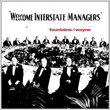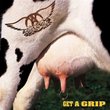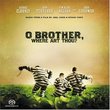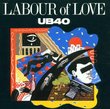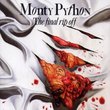| All Artists: Richard [1] Strauss, Herbert von Karajan, Berlin Philharmonic Orchestra Title: Strauss: Also Sprach Zarathustra, Don Juan / Karajan Members Wishing: 1 Total Copies: 0 Label: Deutsche Grammophon Release Date: 4/9/1996 Genre: Classical Styles: Forms & Genres, Theatrical, Incidental & Program Music, Historical Periods, Modern, 20th, & 21st Century, Romantic (c.1820-1910) Number of Discs: 1 SwapaCD Credits: 1 UPC: 028944744125 |
Search - Richard [1] Strauss, Herbert von Karajan, Berlin Philharmonic Orchestra :: Strauss: Also Sprach Zarathustra, Don Juan / Karajan
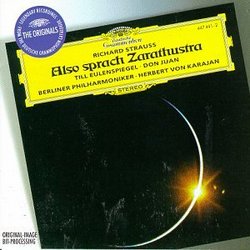 | Richard [1] Strauss, Herbert von Karajan, Berlin Philharmonic Orchestra Strauss: Also Sprach Zarathustra, Don Juan / Karajan Genre: Classical
Herbert von Karajan was a Strauss specialist, and if ever composer and conductor were united in musical philosophy, then these two were. Both favored making a beautiful, creamy, homogenized sound over just about all else... more » |
Larger Image |
CD DetailsSynopsis
Amazon.com essential recording Herbert von Karajan was a Strauss specialist, and if ever composer and conductor were united in musical philosophy, then these two were. Both favored making a beautiful, creamy, homogenized sound over just about all else, and von Karajan clearly relished the opportunities this music offered for playing that combined both tonal opulence and virtuosity. His Zarathustra (a.k.a. 2001: A Space Odyssey) is, along with Fritz Reiner's, probably among the two or three best performances preserved on disc, and von Karajan is nearly flawless on the other works as well. More good news: DG has given him warm, rich sound that's much better than their Berlin average. An essential Strauss collection. --David Hurwitz Similarly Requested CDs
|
CD ReviewsI guess Richard Strauss would be proud of this one... Jason | 06/22/1999 (5 out of 5 stars) "This is surely the best performance of Strauss' Zarathustra I've ever listened to. Karajan, as always, is no less than perfect, and Schwalbé plays a marvelous violin solo. This original analog recording is even better than Karajan's later digital recordings of the same title." Highly Recommended for Straussians and Strauss Novices Jason | 01/02/2001 (5 out of 5 stars) "Recorded in the Jesus-Christus-Kirche in Berlin in 1972 and 1973, Herbert von Karajan's interpretations of these essential Richard Strauss works are among the best available. Although he receives criticism for his interpretations of other composers, Karajan is a near-undisputed master of Strauss (with whom he shared similar musical aesthetics). Although his 1959 and 1960 London/Decca recordings of the same works with the Vienna Philharmonic are also excellent (and also available at a reasonable price), this recording has a bit more atmosphere.Unfortunately, due to its fame, the very familiar introduction of "Also Sprach Zarathustra" overshadows other wonderful sections of Strauss' grand tone poem, including the waltz-like "Tanzlied." Although the introduction is (of course) played with appropriate grandeur and majesty, Karajan and the Berliners make the rest of this work equally memorable. This recording also features two of Strauss' most famous tone poems, including the impish "Till Eulenspiegel" and passionate "Don Juan." Although the former runs the inherent risk of forced humor (the chaos Till creates at the marketplace, the "gross grimace" Till makes at self-important scholars), I've found that a less literal listening of the work makes it more enjoyable; one does not feel compelled to laugh, sit-com like, at canned humor. Barring these personal reservations about this aspect of the work, Karajan and the Berliners play wonderfully. They particularly work best in the sections when Till feels full of himself after the merriment, misery, and mischief he has created, followed immediately by his trial and execution; in this recording, the judges all sound like humorless, fascistic bullies next to poor Till's pleas; that he was "having a little fun." A perennial favorite of Karajan's, and featured in his first-ever professional concert at the age of 20, the Berliners give a rapturous account of "Don Juan." In this work, Karajan has few peers (Rudolf Kempe's unaffected approach, recorded at approximately the same time, provides some of the closest competition). Horns thrust, kettledrums pound, strings sigh sweetly... The orchestra climaxes many times, with moments of profound sensual languor... I can think of no other compelling explanations to recommend this interpretation of Strauss' first major masterpiece. Worth the price of the recording alone.Also worth the price of the recording is the "Dance of the Seven Veils" from Strauss' infamous opera "Salome," another favorite of Karajan's. This is a work lodged firmly between syrupy Romanticism and cruel Modernism, a dichotomy that melds into a truly special musical experience. For those unfamiliar with the rest of Strauss' revolutionary opera, this dance that Salome performs for her stepfather may whet the appetites of potential lovers of the opera (as it did for me). Karajan's sinewy interpretation of this orchestral piece builds to a wondrously frenzied climax, though with less feline sensuality than his 1960 recording with the Vienna Philharmonic.The combination of Karajan and Strauss creates a dangerous magic. So, without reservation, I highly recommend this recording to hardcore Straussians, as well as novices to the composer's aural wonders." Great! Truly one of the very finest Zarathustras dv_forever | Michigan, USA | 12/23/2005 (4 out of 5 stars) "Herbert von Karajan recorded the great Strauss tone-poem Also Sprach Zarathustra three times, each time it was exceptional and each record ranks at the top of the mountain, so to speak. The first record was in 1959 with the Vienna Philharmornic. That was the version used by Stanley Kubrick in 2001: A Space Odyssey. This version that I'm reviewing here is from 1974 with the Berlin Philharmonic and there is a final version from 1983, also with Berlin. This 1974 account is probably the best ever from Karajan and possibly anybody. Perhaps the later 1983 has deeper, richer digital sound but this 1974 account is more passionate and breaths fire. The only reason I give it four and not five stars is the recording itself. The remastering has really brightened up the aural image and it sounds quite fierce at times. The later version, coupled with the tone-poem Don Juan is on the Karajan Gold disc, catalog number 439 016-2. Make sure you get that Gold disc to compare and contrast. If you're a fan of this work, you might want to get them both as there are a few, albeit, slight differences in the 2 recordings.
On this 1974 record I'm reviewing, track 2, Of the Backworldsmen is tremendously powerful, such sweeping string sound unlike in any Zarathustra you've ever heard and let's not forget to mention the riveting timpani at the famous opening. Unbelievable! However the later version packs quite a punch too in places on account of the digital sound, but it's not as driven or intense as this earlier Karajan version. As for the music itself, Zarathustra is one of the most evocative and fascinating of the orchestral works of Strauss, from the famous opening to the transcendent fury to come to the hushed, meditative polytonal ending, contrasting the two keys representing man and nature. I want to pay particular attention to a couple of passages that display Strauss' strengths and weaknesses in this work. Listen to track 6, subtitled Of Science and Learning. Strauss composes a fugue based on all 12 tones of the chromatic scale, years before Schoenberg's shenanigans. The fugue is great, a dark sound rumbling from the bowels of the orchestra and then it grows and grows and wham, you get this ultra sweet sound on high violins! What's up with that? Strauss schmaltzing it up! Well, you can't have everything. Later in the work, Strauss uses the Viennesse waltz to convey the dance of Nietzsche's Superman. This is Strauss being at his ironic and humorous best and worst! Later the orchestra expands and explodes with unrelenting force in the part just before the Midnight Bell and then the music closes beautifully in the Song of the Grave. All in all, the tone-poem is a stunning display of orchestral wizardry and power and no composer in history could utilize the modern orchestra to the farthest range of it's capabilities like Richard Strauss. ( Gustav Mahler, Nicolai Rimsky-Korsakov, Maurice Ravel and Ottorino Respighi are four of his contemporary challengers. Before them, Hector Berlioz was one of the true orchestral innovators and Richard Wagner revolutionized orchestral sound and what the orchestra could do. He stands apart from the others. Without Richard Wagner, there would be no Strauss or Mahler. ) The other works on this CD are quite a success as well, Karajan loved the tone-poem Don Juan and played it many times, Till Eulenspiegel is played well too, I might prefer Haitink's version here. The dance of the seven veils from Salome is highly sensual, but I prefer the power and sexual excitement of Solti's recording for this Salome excerpt. I've heard many Zarathustras, two versions by Solti, the 1954 and 1960 Reiner versions as well as Kempe, Sawallisch, Boulez, Previn, Haitink and others, but it's Karajan I return to. This 1974 is top of the line but make sure to add the digital 1983 recording to your collection as well for comparison's sake, turn it up loud and be swept into ecstasy while sending all your neighbors into a fury! " |

 Track Listings (12) - Disc #1
Track Listings (12) - Disc #1


